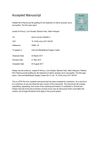 27 citations,
August 2014 in “Wiley interdisciplinary reviews. Developmental biology”
27 citations,
August 2014 in “Wiley interdisciplinary reviews. Developmental biology” The skin and thymus develop similarly to protect and support immunity.
 26 citations,
October 2018 in “Clinical & Translational Oncology”
26 citations,
October 2018 in “Clinical & Translational Oncology” Spanish experts provided guidelines for treating skin side effects in cancer patients on new therapies, stressing early action and teamwork.
 21 citations,
November 2010 in “Journal of molecular medicine”
21 citations,
November 2010 in “Journal of molecular medicine” FoxN1 gene is essential for proper thymus structure and preventing hair loss.
 16 citations,
September 2016 in “Neuropharmacology”
16 citations,
September 2016 in “Neuropharmacology” Activating TSPO helps protect the retina from damage caused by high eye pressure in glaucoma.
 14 citations,
May 2021 in “Marine Drugs”
14 citations,
May 2021 in “Marine Drugs” PDRN, derived from salmon sperm, shows promise in healing wounds, reducing inflammation, and regenerating tissues, but more research is needed to understand its mechanisms and improve its use.
 13 citations,
August 2018 in “Journal of Molecular and Cellular Cardiology”
13 citations,
August 2018 in “Journal of Molecular and Cellular Cardiology” Finasteride improves heart function and repairs damage after heart attack in mice.
 11 citations,
July 2021 in “Nanomaterials”
11 citations,
July 2021 in “Nanomaterials” Wound covers with α-13'-COOH from vitamin E can improve and speed up wound healing.
 10 citations,
April 2016 in “Research and reports in transdermal drug delivery”
10 citations,
April 2016 in “Research and reports in transdermal drug delivery” Transfollicular drug delivery is promising but needs more research to improve and understand it better.
 10 citations,
January 2014 in “Endocrinology & metabolic syndrome”
10 citations,
January 2014 in “Endocrinology & metabolic syndrome” PCOS is a long-term condition that needs more research for better understanding and treatment.
 10 citations,
April 2008 in “Journal of Pediatric Surgery”
10 citations,
April 2008 in “Journal of Pediatric Surgery” P-selectin is not the only factor that prevents scarring in fetal wound healing in mice.
 9 citations,
May 2021 in “Molecules”
9 citations,
May 2021 in “Molecules” New indole-based compounds, particularly cemtirestat, show promise as dual-function drugs for diabetic complications.
 9 citations,
November 2009 in “Recent Patents on Drug Delivery & Formulation”
9 citations,
November 2009 in “Recent Patents on Drug Delivery & Formulation” Microemulsions could improve how drugs are delivered and absorbed in the body.
 7 citations,
February 2019 in “International Journal of Dermatology”
7 citations,
February 2019 in “International Journal of Dermatology” Gray hair is caused by reduced melanin production or transfer issues, linked to aging and possibly health conditions, with treatments focusing on color camouflage.
 3 citations,
May 2023 in “Frontiers in immunology”
3 citations,
May 2023 in “Frontiers in immunology” Faulty inflammasome activation may lead to autoimmune skin diseases and could be a target for new treatments.
 3 citations,
August 2017 in “Oral and Maxillofacial Surgery Cases”
3 citations,
August 2017 in “Oral and Maxillofacial Surgery Cases” Using platelet-rich plasma and fat grafting to treat nerve pain showed promising results with no side effects.
 3 citations,
October 2007 in “Expert Review of Dermatology”
3 citations,
October 2007 in “Expert Review of Dermatology” Hair ages due to various factors and treatments like minoxidil and finasteride can help, but more research and better public awareness are needed.
 2 citations,
November 2012 in “InTech eBooks”
2 citations,
November 2012 in “InTech eBooks” The document concludes that sex hormones are crucial for mammalian reproduction, health, and behavior, and require more research for therapeutic use.
 1 citations,
January 2024 in “Nature communications”
1 citations,
January 2024 in “Nature communications” Activating TLR5 in the gut can extend lifespan and improve health in aged mice.
 1 citations,
January 2024 in “Theranostics”
1 citations,
January 2024 in “Theranostics” Exosomes show promise for future tissue regeneration.
 1 citations,
October 1996 in “Journal of Cutaneous Medicine and Surgery”
1 citations,
October 1996 in “Journal of Cutaneous Medicine and Surgery” Gene therapy shows promise for treating skin disorders and cancer, but faces technical challenges.
 November 2024 in “Journal of Translational Internal Medicine”
November 2024 in “Journal of Translational Internal Medicine” Exosomes from stem cells help hair regrowth by activating a specific signaling pathway.
 October 2024 in “Frontiers in Oncology”
October 2024 in “Frontiers in Oncology” Keratin 18 helps diagnose and predict cancer progression and affects cancer growth and spread.
 May 2024 in “Scientific Reports”
May 2024 in “Scientific Reports” Androgen receptors in the mouse brain may explain cognitive and mood changes in prostate cancer treatment.
 November 2023 in “Klìtinna ta organna transplantologìâ”
November 2023 in “Klìtinna ta organna transplantologìâ” MSC-derived exosomes can help treat COVID-19, hair loss, skin aging, and arthritis.
 November 2023 in “Linköping University medical dissertations”
November 2023 in “Linköping University medical dissertations” Keratinocytes and adipose-derived stem cells can effectively heal difficult skin wounds.
 October 2023 in “JOJ dermatology & cosmetics”
October 2023 in “JOJ dermatology & cosmetics” Thiocyanate helps hair growth and can be supplemented in diet or applied topically.
 November 2022 in “CARDIOMETRY”
November 2022 in “CARDIOMETRY” A group has developed therapies that show promise for treating cancer and various other conditions.
 May 2022 in “Pharmacognosy journal”
May 2022 in “Pharmacognosy journal” Moringa seed oil may help prevent hair loss and promote hair growth.
 January 2019 in “Advances in stem cells and their niches”
January 2019 in “Advances in stem cells and their niches” Skin health and repair depend on the signals between skin stem cells and their surrounding cells.
Avicennia Marina extract and avicequinone C can reduce hair loss hormone production and increase hair growth factors, suggesting they could be used to treat androgenic alopecia.





























